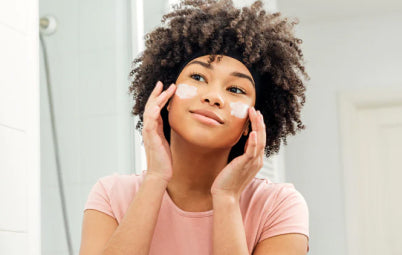If you have sensitive skin, you’ll know just how easily it can react. One minute, your complexion feels fine, and the next it’s red, tight, itchy, or stinging. From skincare products to makeup to even the weather, it can feel like everything is a trigger.
But in most cases, reactions are caused by just a few common ingredients. And once you know what to avoid, managing sensitive skin becomes a whole lot easier.
Not sure where to start? Book a free 30-minute online consultation with a Face Dr skin expert. We’ll help you figure out what’s irritating your skin, what to use instead, and how to build a routine that keeps your complexion calm, healthy, and protected.
What is sensitive skin?

If you have sensitive skin, you’re probably well aware of the symptoms. It can include everything from stinging and burning sensations to redness and dry patches, small bumps, itchiness and dry and dehydrated skin.
Sensitive skin can be something you’re born with or something you develop over time. Alternatively, it could be triggered by something.
The common triggers include:
- Skincare products like those with alcohol, strong acids or fragrances
- Other products — like laundry detergents, make-up or shower products
- Environmental triggers — very hot or cold temperatures and pollution
- Excessive sun exposure and UV damage
- Hormonal changes
Though each of these things can cause a reaction, the most common by far is the ingredients you put on your face. This is why it’s so important to check the skincare products you currently use and check any new ones before you purchase them for the most common irritating ingredients.
Here’s what to look out for.
Which ingredients to avoid if you have sensitive skin

Definitely avoid
These are the most common irritating ingredients to those of use with sensitive skin:
Alcohol
Alcohol is a common skincare ingredient and while many skin types can handle it, most people with sensitive skin find it too drying. It strips the skin of its natural oils, leaving it dehydrated, damaged and prone to redness and irritation. You should check all skincare products for alcohol, but it’s especially common in toners. Some products contain a small percentage of alcohol and may be safe for those with mild to moderate sensitivity. It’s always best to speak with a skin expert about this to make sure you’re using the best products for your sensitive skin.
Fragrances

Fragrances can be found in everything from serums to face masks. While they may make the product smell nice, this artificial addition can aggravate sensitive skin. Look out for fragrance-free products and be wary of anything labelled “unscented,” which can sometimes mean that a fragrance was added to mask a scent, instead of being truly “fragrance-free.” However, it’s not always that easy. Even “fragrance-free” products can include added scents. Look out for essential oils and plant extracts, like lavender extract, which can change the scent without the product having to be labelled as fragranced.
You can also do a little more research before buying a product to make sure it’s truly fragrance-free. Look up reviews and ask for a sample pot to do a smell test or small patch test yourself. But the very best way to ensure you’re using products that are safe for sensitive skin is by getting recommendations directly from a skin expert who can decode those confusing ingredient lists and only recommend products they know and trust.
Sulfates
Sulfates can be found everywhere from toothpastes to shampoos, but they’re also common in skincare, especially in cleansers. It’s sulfates that make these products foam and lather. However, sulfates can also cause the skin to lose moisture, leaving it dry and dehydrated and much more prone to irritation. Some sulfates can even damage the skin’s natural barrier, increasing sensitivity even more.
Face Dr top tip: Sulfates come with many names. Look out for sodium lauryl sulfate and sodium laureth sulfate on ingredient lists.
Chemical sunscreens

Sunscreen is an essential part of your everyday skincare routine. Not only will it help to protect your skin from UV rays — which can cause everything from wrinkles to hyperpigmentation — it can also help to keep your skin’s natural barrier as strong as possible, a key factor in keeping your sensitivity down. However, the wrong sunscreen could be doing more harm than good.
Avoid chemical sunscreens, which can contain ingredients like avobenzone, octinoxate, and oxybenzone and instead opt for mineral ones that use ingredients like titanium dioxide and zinc oxide. These protect your skin from the sun without being overly harsh.
Face Dr top pick: ZO Skin Health Broad Spectrum SPF 50 around £44
Salicylic acid
Salicylic acid is a go-to ingredient for those with oily skin or acne, but for those with sensitive skin, even if you have oily skin, too, it can be too harsh. This ingredient is very drying and it can even cause burning and redness for those prone to reactions so it’s best to steer clear unless it’s recommended by a skincare professional. If you have oily and sensitive skin, you should stick to hyaluronic acid, clay products and niacinamide.
Potentially avoid

Everyone’s skin is different, so those who have extra sensitive skin may find they can’t use any of the below. For those with mild to moderate sensitivity, however, you may find the following ingredients don’t cause a reaction at all, especially if you introduce them slowly.
Essential oils
Ingredients like tea tree oil and lavender oil may sound gentle and natural, but they can actually be harming extra-sensitive skin. They can be very drying and trigger a reaction. If your skin is especially sensitive, it may be best to avoid essential oils altogether. If you have mild to moderate sensitivity, you may be able to use essential oils in lower percentages or after they’ve been diluted.
Acids
Acids are great for exfoliating the skin and breaking down dead skin cells without having to pull and tug with physical scrubs. However, acids are a harsh and drying ingredient and can easily strip the skin of moisture and damage it. For sensitive skin, look out for weak concentrations of acid exfoliators, like one that’s just 10%, and lactic acid in particular, which is more gentle than other acids.
Witch hazel

Witch hazel can be found everywhere from serums to toners. It’s a useful ingredient for those with rosacea, oily skin and acne. But when it comes to sensitive skin, witch hazel may be too harsh.
Witch hazel is often mixed with alcohol to make it into a skincare product. This makes it especially drying and potentially damaging to easily irritated skin.
Although witch hazel is derived from a plant and is full of antioxidants, those with sensitive skin still need to be careful. Introduce this product slowly and be sure to use a witch hazel product that doesn’t contain any added fragrances. It can be beneficial for those who are acne-prone or have oily skin and sensitive skin, but those with dry sensitive skin may be better off avoiding it altogether.
Vitamin E
We’re used to thinking that any vitamin is good for us, but this isn’t the case for those of us with sensitive skin. Vitamin E can be great for helping the skin heal. Those with dry skin and even some people with eczema can normally tolerate it. But if you have extra sensitive skin, you should start using it with caution.
Products with a high percentage of the ingredient can cause a reaction, redness and even a rash for those with extra sensitive skin. For those with moderate and mild levels of sensitivity, use a very small amount of the product and check for dryness or redness before using more. Instead of using a strong Vitamin E serum, look out for this ingredient in moisturisers instead where it’s often much milder.
Looking for tailored advice on what to avoid?

While this is a good starting point for what to look out for when choosing skincare, everyone’s skin is different. What some people should avoid at all times, others may find really works for them. What’s more, you may find your skin’s sensitivity changes over time, so the ingredients you can use change over time, too. Sound confusing? It doesn’t have to be.
Here at Face Dr, we offer free online consultations to help you understand exactly what you should be using and avoiding with sensitive skin. In a 30-minute video call, one of your skin experts can analyse your skin and determine your level of sensitivity. They can ask about any other skincare concerns you have, like acne or hyperpigmentation, and then make tailored recommendations for the perfect products to help.
They can even put together a routine to follow to help soothe sensitive skin and get it glowing. There’s never any obligation to buy, and we only ever recommend products that we’ve tried, tested and seen real results from. Take a look at our collection of skincare products we recommend for sensitive skin here.









